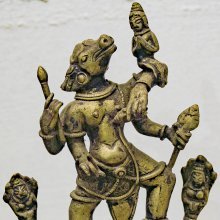Yajnavaraha, Yajñavarāha, Yajna-varaha: 8 definitions
Introduction:
Yajnavaraha means something in Hinduism, Sanskrit. If you want to know the exact meaning, history, etymology or English translation of this term then check out the descriptions on this page. Add your comment or reference to a book if you want to contribute to this summary article.
Images (photo gallery)
In Hinduism
Purana and Itihasa (epic history)
Source: Cologne Digital Sanskrit Dictionaries: The Purana IndexYajñavarāha (यज्ञवराह).—An avatār in Gomatī tīrtha;1 vārāham rūpa; the boar described; the Vedas are the feet, upa, teeth; yajña, breast; citi, mouth; fire, tongue; kuśa grass, hair; Brahmā, head; day and night, eyes; Vedangas and śrutis, jewels; ghee, nose; sruva, face; sāmaghoṣa, the speech, embodiment of satya and dharma, ūrdhvagātra, nerves; homa, linga; the residence, ocean; Vedi, the inner body; mantras, the hinder part, soma, blood; Veda, skandha; havi, the smell and pride; havya-kavya fast running; prāgvaṃśa prāyaścitta, the terrible chariot; the body, Dakshiṇa heart; upākarmeṣṭhi, the pleasant form, pravargya materials, ornaments; different metres footpath, upaniṣad the seat; Chāyā wife and tall as Maṇisṛṅga.2

The Purana (पुराण, purāṇas) refers to Sanskrit literature preserving ancient India’s vast cultural history, including historical legends, religious ceremonies, various arts and sciences. The eighteen mahapuranas total over 400,000 shlokas (metrical couplets) and date to at least several centuries BCE.
Languages of India and abroad
Sanskrit dictionary
Source: DDSA: The practical Sanskrit-English dictionaryYajñavarāha (यज्ञवराह).—Viṣṇu in his boar incarnation.
Derivable forms: yajñavarāhaḥ (यज्ञवराहः).
Yajñavarāha is a Sanskrit compound consisting of the terms yajña and varāha (वराह).
Source: Cologne Digital Sanskrit Dictionaries: Shabda-Sagara Sanskrit-English DictionaryYajñavarāha (यज्ञवराह).—m.
(-haḥ) Vishnu in his boar-incarnation. E. yajña, and varāha the boar.
Source: Cologne Digital Sanskrit Dictionaries: Benfey Sanskrit-English DictionaryYajñavarāha (यज्ञवराह).—m. Viṣṇu, [Johnson's Selections from the Mahābhārata.] 94, 55 (
Yajñavarāha is a Sanskrit compound consisting of the terms yajña and varāha (वराह).
Source: Cologne Digital Sanskrit Dictionaries: Monier-Williams Sanskrit-English DictionaryYajñavarāha (यज्ञवराह):—[=yajña-varāha] [from yajña > yaj] m. Viṣṇu in the boar-incarnation, [Horace H. Wilson]
Source: Cologne Digital Sanskrit Dictionaries: Yates Sanskrit-English DictionaryYajñavarāha (यज्ञवराह):—[yajña-varāha] (haḥ) 1. m. Boar incarnation.
[Sanskrit to German]
Sanskrit, also spelled संस्कृतम् (saṃskṛtam), is an ancient language of India commonly seen as the grandmother of the Indo-European language family (even English!). Closely allied with Prakrit and Pali, Sanskrit is more exhaustive in both grammar and terms and has the most extensive collection of literature in the world, greatly surpassing its sister-languages Greek and Latin.
See also (Relevant definitions)
Partial matches: Yajna, Varaha.
Full-text: Yajnasukara, Upakarmeshti, Gomati.
Relevant text
Search found 13 books and stories containing Yajnavaraha, Yajna-varaha, Yajña-varāha, Yajñavarāha; (plurals include: Yajnavarahas, varahas, varāhas, Yajñavarāhas). You can also click to the full overview containing English textual excerpts. Below are direct links for the most relevant articles:
The Skanda Purana (by G. V. Tagare)
Chapter 277 - Greatness of Bhūdhara (Yajñavarāha) < [Section 1 - Prabhāsa-kṣetra-māhātmya]
Chapter 52 - The Glorification of Śiprā < [Section 1 - Avantīkṣetra-māhātmya]
Chapter 354 - Greatness of Kardamāla < [Section 1 - Prabhāsa-kṣetra-māhātmya]
Garga Samhita (English) (by Danavir Goswami)
Verse 5.15.24 < [Chapter 15 - Seeing Sri Radha]
Chaitanya Bhagavata (by Bhumipati Dāsa)
Verse 2.3.53 < [Chapter 3 - The Lord Manifests His Varāha Form in the House of Murāri and Meets with Nityānanda]
Verse 2.3.42 < [Chapter 3 - The Lord Manifests His Varāha Form in the House of Murāri and Meets with Nityānanda]
Verse 2.3.21-024 < [Chapter 3 - The Lord Manifests His Varāha Form in the House of Murāri and Meets with Nityānanda]
The Padma Purana (by N.A. Deshpande)
Chapter 169 - Varāha-tīrtha < [Section 6 - Uttara-Khaṇḍa (Concluding Section)]
Chapter 237 - The Boar Incarnation of Viṣṇu < [Section 6 - Uttara-Khaṇḍa (Concluding Section)]
Chapter 228 - Description of the Highest Heaven etc. < [Section 6 - Uttara-Khaṇḍa (Concluding Section)]
The Linga Purana (by J. L. Shastri)
Chapter 94 - Uplifting the Earth (varāha-prādurbhāva) < [Section 1 - Uttarabhāga]
Brihad Bhagavatamrita (commentary) (by Śrī Śrīmad Bhaktivedānta Nārāyana Gosvāmī Mahārāja)
Verse 2.2.49 < [Chapter 2 - Jñāna (knowledge)]
Related products

